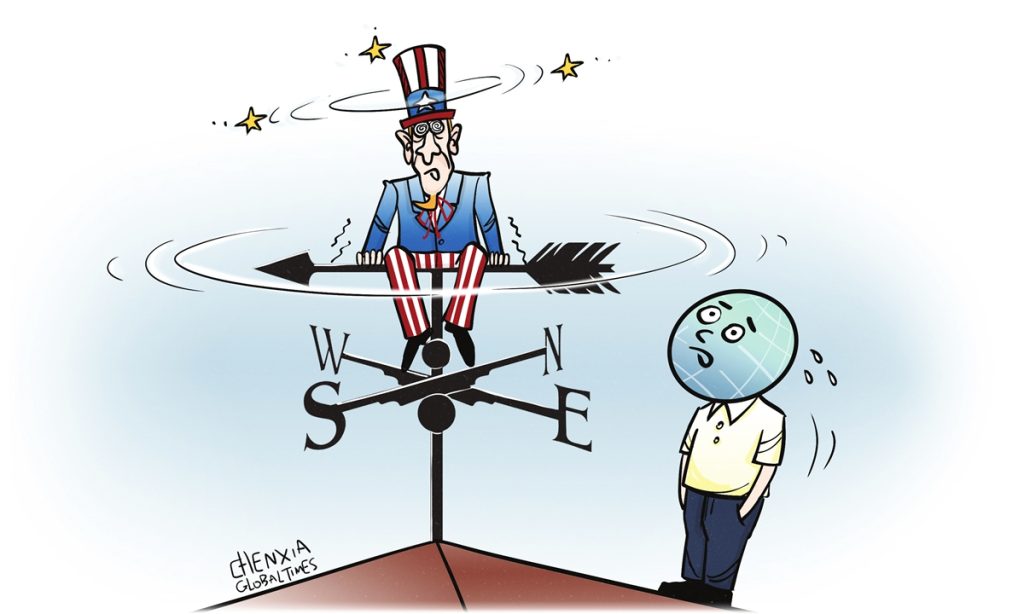The world needs to worry more about the US

Barring any unexpected developments in the coming months, voters in the US will once again choose between a Cold War-loving Democrat and an out-of-control Republican to be their next president. The world should be concerned. Perhaps the world has already realized that moving in another direction is wise.
Joe Biden will again be the Democratic nominee. Yes, Robert Kennedy, Jr., who hates vaccines and embraces anti-Semitic ideas, is challenging the president for the party's nomination, but he has little support among Democratic voters. As a result, Biden, who will be 81 years old in November, is guaranteed to be his party's choice.
Donald Trump, the man who claims to be a Christian despite being married three times and who endorses racist ideas, continues to hold an iron grip on the Republican Party. He faces a string of legal challenges in the US, some connected to his failed 2020 re-election bid, and yet right-wing voters have shown no sign of distancing themselves from the man who has zero interest in anyone other than himself. And he is 77 years old.
In other words, America's two presidential candidates seem certain to be men who want to tackle some of the world's most vexing problems with a mindset tied to yesterday. In part, that means neither President Biden nor former president Trump appears to want China as a partner in finding solutions to issues such as climate change, food insecurity and disease prevention. A belief that the US and its allies can be trusted to address global problems alone is at best short-sighted; at worst, it is rejected and explains why many nations in the Global South are hesitant to link their futures with America.
The annual BRICS summit took place from August 22 to 24 in South Africa. The summit garnered significant attention when six countries were invited to join the group. Two of the invitations went to Iran and Saudi Arabia, longtime regional rivals that earlier this year agreed to improved ties in a deal brokered by China. And China's Foreign Minister, Wang Yi, believes that his country will make further advances toward peace and cooperation throughout the Middle East.
In addition to Iran and Saudi Arabia, Argentina, Egypt, Ethiopia and the United Arab Emirates are expected to join the BRICS community at the beginning of 2024. Let's not forget that the current construction of BRICS already represents 40 percent of the world's population and more than 25 percent of global GDP. Those percentages will increase; when they do, Western hegemony will come under further scrutiny. Figures like Biden and Trump will not like that.
Remember, Biden views China through a Cold War lens, meaning he sees the country as an existential threat to the US, democracy and the global order. Actions, such as endorsing US naval training exercises in the South China Sea that he knows will antagonize China, are never far from Biden's thought process. On top of that, he often plays a bait-and-switch game: He sends leading members of his Cabinet to Beijing to meet with their Chinese counterparts, creating hope throughout the world that the two economic superpowers will cooperate. Within days, however, the US will say or do something that affirms its dislike and distrust for the Chinese government.
Trump's hatred for China is well known. He deliberately called COVID-19 the "Wuhan virus" or the "China virus" even though scientists and medical professionals from around the world told him such words would spark a rise in anti-China and anti-Asian hate. He slapped reckless tariffs on Chinese goods, insisting they were necessary in order to rein in America's massive debt, and then refused to alter the policy despite evidence that the tariffs were hurting America more than China. Finally, he initiated the "China initiative," which he maintained would uncover countless numbers of Chinese-born educators who were seeking to steal sensitive technological secrets.
What the global community is affirming more and more each day is that despite the many differences Biden and Trump have in political, economic and social ideologies, there is a unifying element to these men: They want every corner of the globe to believe that China is the nation that poses increasing danger to the world. But when it pays close attention, the global community sees a different conclusion which is becoming clearer and clearer: China continues to advance efforts - the Belt and Road Initiative being one example - that involve promoting win-win partnerships.
What the world needs is to find prospects for peace. Sitting at the apex of BRICS, and establishing economic partnerships all over the world, China is characterized as the nation that can bring about a needed change in the 21st century. Meanwhile, the US is again locked into a 20th-century construct, the Cold War, that prevents its ability to be a positive change agent.
The world is watching.